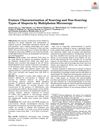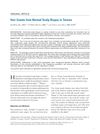TLDR Middle-aged women with chronic telogen effluvium experience increased hair shedding but usually don't get significantly thinner hair.
In 1996, a study involving 355 patients (346 females, 9 males) investigated chronic telogen effluvium (CTE), a condition causing increased hair shedding, particularly in middle-aged women. The study aimed to define clinical and pathological characteristics of CTE and distinguish it from androgenetic alopecia (AGA) and other hair loss causes. Findings indicated that CTE patients had an average of 39 hairs shed with a terminal/vellus-like hair ratio of 9:1 and 89% of terminal hairs in the anagen phase. In comparison, AGA patients had an average of 35 hairs shed with a 1.9:1 ratio and 83.2% of terminal hairs in the anagen phase. CTE was found to affect women aged 30-60, starting abruptly, and could be identified by its clinical and histologic features. The condition has a prolonged, fluctuating course but is often self-limiting and does not lead to significant thinning in 80-90% of cases. The study highlighted the need for further research to understand hair cycle controls and develop effective treatments for CTE.
83 citations
,
September 1993 in “Endocrinology and Metabolism Clinics of North America”  309 citations
,
May 1993 in “Journal of The American Academy of Dermatology”
309 citations
,
May 1993 in “Journal of The American Academy of Dermatology” Horizontal scalp biopsy sections effectively diagnose and predict MPAA, with follicular density and inflammation impacting hair regrowth.
 214 citations
,
March 1993 in “Archives of Dermatology”
214 citations
,
March 1993 in “Archives of Dermatology” Telogen effluvium is a reversible hair loss condition that requires a detailed diagnosis and often resolves on its own.
 139 citations
,
July 1991 in “Journal of The American Academy of Dermatology”
139 citations
,
July 1991 in “Journal of The American Academy of Dermatology” Understanding hair follicle anatomy helps diagnose hair disorders.
 124 citations
,
August 1990 in “British Journal of Dermatology”
124 citations
,
August 1990 in “British Journal of Dermatology” Diffuse alopecia in women may be related to androgens and iron deficiency, and basic hormone and nutrient screening is useful.
 666 citations
,
September 1977 in “British Journal of Dermatology”
666 citations
,
September 1977 in “British Journal of Dermatology” Common baldness, also known as Androgenetic Alopecia, is caused by a combination of genetic factors and hormones called androgens.
 32 citations
,
June 1976 in “JAMA”
32 citations
,
June 1976 in “JAMA” Crash dieting can cause hair loss due to severe calorie restriction.
 24 citations
,
September 2018 in “Lasers in Surgery and Medicine”
24 citations
,
September 2018 in “Lasers in Surgery and Medicine” Multiphoton microscopy can non-invasively tell apart scarring from non-scarring hair loss and could aid in treatment.
 August 2018 in “Oxford University Press eBooks”
August 2018 in “Oxford University Press eBooks” The document's conclusion cannot be provided because the document cannot be parsed.
 6 citations
,
December 2014 in “Clinical and Experimental Dermatology”
6 citations
,
December 2014 in “Clinical and Experimental Dermatology” Hair density and thickness decrease in all scalp areas for East Asians with AGA.
 24 citations
,
September 2012 in “Dermatologic Surgery”
24 citations
,
September 2012 in “Dermatologic Surgery” The conclusion is that normal scalp hair counts for Taiwanese people were established, showing age-related differences but not sex or scalp location differences.
 6 citations
,
August 2006 in “Journal of Cutaneous Pathology”
6 citations
,
August 2006 in “Journal of Cutaneous Pathology” Two teenage brothers had a rare, treatment-resistant form of female-pattern hair loss with unusual scalp changes.
January 2001 in “대한피부과학회지” Horizontal sectioning helps diagnose hair loss, but Korean follicle differences matter.
 21 citations
,
May 1996 in “Current problems in dermatology”
21 citations
,
May 1996 in “Current problems in dermatology” Detailed patient history and physical exams are crucial for diagnosing hair loss.
 5 citations
,
October 1988 in “Clinics in Dermatology”
5 citations
,
October 1988 in “Clinics in Dermatology” Minoxidil promotes hair growth but exact mechanism is unknown.













